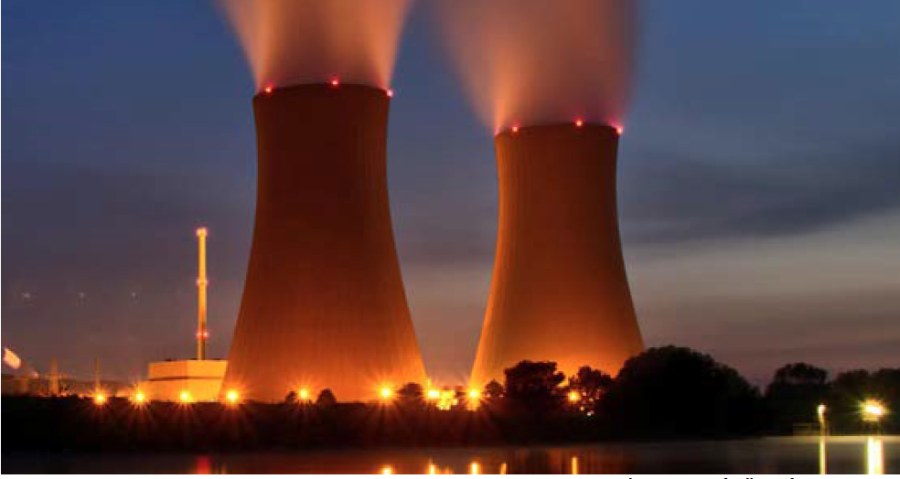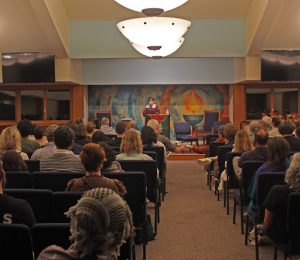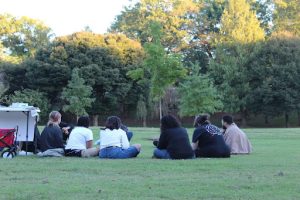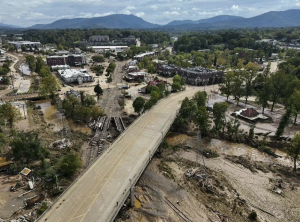Students discuss the use of nuclear power
Russia’s invasion of Ukraine has caused many nations to begin searching for alternative sources of energy
Photo courtesy of the Bulletin of Atomic Scientists
As fuel prices continue to rise globally, conversations regarding alternative sources of energy have grown in popularity and placed nuclear energy at the forefront of discussions.
March 17, 2022
Conor Metzger: Well, Aine, it looks like the recent Russian invasion has raised the question of energy independence. Americans are experiencing rising gas prices — in spite of only using a small amount of Russian oil — because oil is priced on a global market. It makes me wonder if we should open up another conversation about other alternative energy sources, especially nuclear power, which has divided people due to its perceived risks.
Aine Pierre: The Russian invasion has raised lots of questions over energy sources. I fall on the side that stipulates that nuclear power should not be used. Russia’s assault on the Zaporizhzhia Nuclear Power Plant during its invasion, and the near Chernobylstyle calamity that it almost caused, is part of what gives me pause about increased investment in nuclear power. If there were to be an internal or external attack on one of the United States’ nuclear power plants, it could spell disaster for hundreds, thousands or even millions of people.
Additionally, as recently as three years ago, Russian hackers attempted to cyberattack the United States’ nuclear power plants. The nuclear plants’ cyber defenses held, but there is no guarantee that this would always be the case. Because of how computerized our infrastructure is nowadays, it would be impossible to build a nuclear reactor completely off the grid. Granted, a Russian cyberattack could shut down other alternative energy plants, but none would have such disastrous effects as a nuclear reactor meltdown.
CM: I agree that there is that risk, but, like you said, everything is on the grid. Our traffic system, our healthcare network and our national security are all on a grid. If any of these fail, it could mean calamity for the entire country. I don’t think the argument of it being attacked through cybersecurity is enough for us not to consider it. Also, the fact that the ground invasion did not cause a meltdown shows that every party is well aware of that danger. The actual fire was not near the nuclear reactor. This is an example of the media overhyping the danger of nuclear power.
This is not to say that we need not be mindful of the risks, but the benefits of nuclear power seem to outweigh these dangers. According to the U.S. Department of Energy, nuclear power is producing 92% of its capacity, compared to the next closest renewable source, geothermal, which is only producing about 74% capacity.
AP: I’m not sure I agree with your logic there. Healthcare and traffic systems can be cyberattacked, but neither of those would be catastrophic on the scale that a nuclear meltdown would. Hospital record systems have gone down, and those problems can be fixed in hours. Three Mile Island, the site of a nuclear reactor meltdown in the United States, is still radioactive decades later. Also, with regard to the Russian attack, the administrative building caught fire because heavy artillery was firing right at the nuclear reactor and that building happened to be in the way, according to NPR.
I agree that nuclear energy is remarkably efficient compared to its peers, but the risks are far too great. This is to say nothing of the fact that there is incredible environmental racism at play in terms of the location of nuclear power plants and the storage of nuclear waste.
Many nuclear power plants are located on Native American lands, and one of the federal government’s prominent nuclear waste storage sites is also on Native land. Another waste site in Minnesota built on Native land has been causing harmful effects for the people who live near it, but the U.S. Government continued to increase the amount of waste held at the site.
Nuclear waste and the prospect of meltdown make nuclear energy not worth the risk in my opinion. I’m not even mentioning the fact that it is disproportionately Black and Indigenous People of Color who pay the brunt of the cost.
CM: We can work on environmental racism — so I do not think this is a good enough reason. There is also environmental racism in almost every form of energy production so if we want to address that we need to do it on a broad scale and not handcuff it to nuclear energy.
As for the example of Three Mile Island, if we go into a broad scope, you will see that other energy sources actually kill more people per year. Solar power alone has a national death rate average of 0.44%, yet only has about a 35% efficiency. In contrast, nuclear power has a death rate of around 0.04%, accounting for the after-effects of radiation. I think the media has a tendency to hype up these accidents because “nuclear” is such a buzzword.
I disagree with your assertion that healthcare systems are less harmful to society if hacked. I did not just mean records, I meant the machines that run life support systems, the lights that allow surgeons to see and the computers that account for life-saving medicine. All of these things are on the current grid and are subject to cyberattacks. It is a fact we have to live with and so we should instead be looking at increasing our cybersecurity in a broad sense, not handcuffing an issue that has a wide effect to a singular aspect.
What I also want to bring up is the waste you mentioned. All the current nuclear waste the United States has generated can currently be held on one basketball court about 50 feet high. If you compare this to other energy sources, this is a negligible amount. I will concede, however, that transportation is an issue when it comes to nuclear waste.
AP: I would not be so quick to dispense with environmental racism, as it has been shown that the U.S. government blatantly ignores these issues rather than dealing with them head-on.
I will concede that of your examples, healthcare systems falling prey to cyberattacks is the most dangerous; however, I still believe a cyberattack on a nuclear plant would be catastrophic, and while we cannot avoid taking care of our sick, we can avoid the use of nuclear power.
Your argument about deaths per terawatt hour is interesting and compelling, but I wonder if that measure only includes deaths associated with nuclear power production and its accidents and not its inputs and outputs. A study from the International Journal of Epidemiology which studied over 100,000 uranium miners found that almost half of them died of cancer related-causes to their time in the mines. Nuclear waste storage sites have also been sites of increased cancer deaths relative to local and national averages. I would be interested to see what an updated death rate would be with those statistics in the mix.
Ultimately, though, I think we can agree that recent events have put sources of renewable energy at the forefront of conversations regarding America’s energy future. I think earnest debates like these will be important to making informed decisions about renewable energy.
CM: I agree, and I think having conversations such as these is a good way of moving forward so that we can make sure we are creating a better environment and a better world for our future’s sake. Thanks for taking the time to have this conversation!













